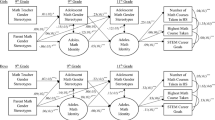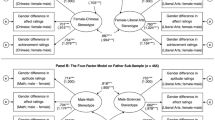Abstract
Three studies examined stereotypes about the abilities of women and men and their implications for self-evaluation. All the three studies suggest that women are generally perceived as better than men in language and that men are generally perceived as better than women in science and math. Furthermore, Study 1 reveals that female university students in psychology who believe that men are better than women in science feel significantly less able in science, have lower self-esteem, and report lower school average than students who do not believe that men are better than women in science. Study 2 shows that female high school students in a language career track rate their own ability in science less highly and report lower school grades in math when gender stereotypes are salient than when they are not. Study 3 shows that male university students in science tend to rate their own ability in language less highly and report significantly lower school grades in language when gender stereotypes are activated prior to their self-evaluation than when they are not. Overall, the findings suggest that gender stereotypes can have detrimental consequences for self-concept of ability of both male and female students. The theoretical and practical implications of these results are discussed.
Similar content being viewed by others
References
Baron, Robert A. & Byrne, Don (1987). Social psychology. Boston: Allyn & Bacon.
Beaudelot, Roger & Establet, Christian. (1992). Allez les filles Paris: Seuil.
Biernat, Monica (1991). Gender stereotypes and the relatioship between masculinity and femininity: A developmental analysis. Journal of Personality and Social Psychology, 61, 351–365.
Brown, Ryan P. & Josephs, Robert A. (1999). A burden of proof: Stereotype relevance and gender differences in math performance. Journal of Personality and Social Psychology, 76, 246–257.
Crocker, Jennifer, Major, Brenda, & Steele, Claude (1998). Social stigma. In Gilbert, D., Fiske, S., & Lindzey, G. (Eds.), Handbook of social psychology (4th edn.). Boston: McGraw-Hill.
Deaux, Kay (1985). Sex and gender. Annual Review of Psychology, 36, 49–81.
Eagly, Alice H. & Steffen, Valerie J. (1984). Gender stereotypes stem from the distribution of women and men into social roles. Journal of Personality and Social Psychology, 46, 735–754.
Eccles Parsons, Jacquelynne, Adler, T., & Meece, Judith L. (1984). Sex differences in achievement: A test of alternate theories. Journal of Personality and Social Psychology, 46, 26–43.
Ellemers, Naomie, Spears, Russel, & Doosje, Bertrand (1999). Social identity. Oxford: Blackwell.
Festinger, Leon (1954). A theory of social comparison processes. Human Relations, 7, 117–140.
Guimond, Serge (1993). Gender stereotypes, self-evaluations and career choices. Paper presented at the Sixteenth Annual Meeting of the International Society of Political Psychology, Cambridge, MA.
Guimond, Serge & Roussel, Lydie. (In press). L'activation des stéréotypes de genre, l'évaluation de soi et les choix d'orientation. In Beauvois, J.L., Joule, R.V., & Monteil, J.M. (Eds.), Perspectives cognitives et conduites sociales (Vol. 8). Rennes: Presses Universitaires de Rennes.
Halpern, Diane F. (1986). Sex differences in cognitive abilities. Hillsdale, NJ: Lawrence Erlbaum.
Hyde, Janet Shibley, Fennema, Elizabeth, & Lamon, Susan J. (1990). Gender differences in mathematics performance: A meta-analysis. Psychological Bulletin, 107, 139–155.
Jost, John T. & Banaji, Mazarin R. (1994). The role of stereotyping in system-justification and the production of false consciousness. British Journal of Social Psychology, 33, 1–27.
Kimball, Meredith M. (1989). A new perspective on woman's math achievement. Psychological Bulletin, 105, 198–214.
Kulak, Alison G. & Lefevre, Jo-Anne (1993). Developmental and gender differences in math anxiety. Paper presented at the annual convention of the Canadian Psychological Association, Montréal, May.
Lefevre, Jo-Anne, Kulak, Alison G., & Heymans, Stéphanie L. (1992). Factors influencing the selection of university majors varying in mathematical content. Canadian Journal of Behavioral Science, 24, 276–289.
Maccoby, Eleanor E. & Jacklin, C.N. (1974). Psychology of sex differences. Palo Alto, CA: Stanford University Press.
Major, Brenda, Spencer, Steven, Schmader, Toni, Wolfe, Connie, & Crocker, Jennifer (1998). Coping with negative stereotypes about intellectual performance: The role of psychological disengagement. Personality and Social Psychology Bulletin, 24, 34–50.
Meece, Judith L., Eccles Parsons, Jacquelynne, Kaczala, Caroline M., Goff, Suzan B., & Futterman, Robert (1982). Sex differences in math achievement: Toward a model of academic choice. Psychological Bulletin, 91, 324–348.
Mummendey, Amélie, Kessler, Thomas, Klink, Andreas, & Mielke, Rosematie (1999). Strategies to cope with negative social identity: Predictions by social identity theory and relative deprivation theory. Journal of Personality and Social Psychology, 76, 229–245.
Rosenberg, Morris (1965). Society and the adolescent self-image. Princeton, NJ: Princeton University Press.
Sidanius, Jim & Pratto, Felicia (1999). Social dominance: An intergroup theory of social hierarchy and oppression. New York: Cambridge University Press.
Spencer, Steven J., Steele, Claude M., & Quinn, Diane, M. (1999). Steretype threat and women's math performance. Journal of Experimental Social Psychology, 35, 4–28.
Stangor, Charles & Sechrist, Gretchen B. (1998). Conceptualizing the determinants of academic choice and task performance across social groups. In Swim, J.K. & Stangor, C. (Eds.), Prejudice: The target's perspective. San Diego: Academic Press; pp. 105–124.
Steele, Claude M. (1997). A threat in the air: How stereotypes shape intellectual identity and performance. American Psychologist, 52, 613–629.
Steele, Claude M. & Aronson, Joshua (1995). Stereotype thrat and the intellectual test performance of African Americans. Journal of Personality and Social Psychology, 69, 797–811.
Swan, Suzanne & Wyer Jr., Robert S. (1997). Gender stereotypes and social identity: How being in the minority affects judgments of self and others. Personality and Social Psychology Bulletin, 23, 1265–1276.
Tajfel, Henri (1974). Social identity and intergroup behavior. Social Science Information, 13, 65–93.
Tajfel, Henri & Turner, John C. (1979). An integrative theory of intergroup conflict. In Worchel, S. & Austin, W.G. (Eds.), The social psychology of intergroup relations. Pacific Grove, CA: Brooks/Cole; pp. 33–48.
Williams, John E. & Best, Deborah L. (1986). Sex stereotypes and intergroup relations. In Worchel, S. & Austin, W.G. (Eds.), Psychology of intergroup relations. Chicago: Nelson-Hall pp. 244–259.
Williams, John E. & Best, Deborah L. (1990). Measuring sex stereotypes: A multination study. London: Sage.
Wood, Wendy, Christensen, P. Niels, Hebl, Michelle R., & Rothgerber, Hank (1997). Conformity to sex-typed norms, affect, and the self-concept. Journal of Personality and Social Psychology, 73, 523–535.
Author information
Authors and Affiliations
Rights and permissions
About this article
Cite this article
Guimond, S., Roussel, L. Bragging About One's School Grades: Gender Stereotyping and Students' Perception of Their Abilities in Science, Mathematics, and Language. Social Psychology of Education 4, 275–293 (2001). https://doi.org/10.1023/A:1011332704215
Issue Date:
DOI: https://doi.org/10.1023/A:1011332704215




